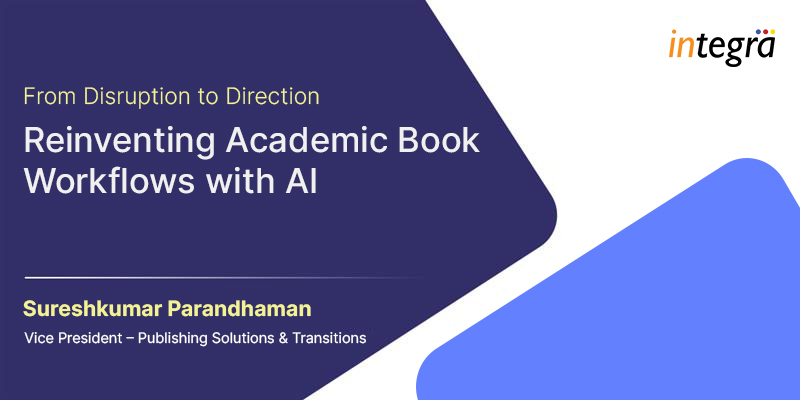Does NLP mean business in the digital content development domain?

Publishing has witnessed some very interesting and disruptive transformations over the years. In today’s digital landscape, the publishing industry is quickly moving from a book-based product model to a services-based business model. Moreover, technological advancements have brought with them multitudes of opportunities and possibilities in learning and publishing.
Technological advancement isn’t complete without bringing in the term Artificial Intelligence (AI). Before we continue, let us quickly break AI down for you:
AI helps in building systems that can carry out intelligent tasks. Machine Learning (ML) and Natural Language Processing (NLP) are the two subsets of AI. While ML helps in building systems that can learn from experience, NLP helps in building systems that can understand language. Used together, ML and NLP help in building systems that can swiftly pick up languages.
AI capabilities have advanced to a large extent. In the context of the Publishing space, AI can automate significant portions of workflows, implying a direct positive effect on businesses and authors as well as the research community.
It is a long road ahead for NLP and AI to emulate human intelligence in content creation, and it is to be seen how both the industry and consumers together respond to a prospect like this. However, it cannot be ignored that NLP has made its indelible impact in the Publishing industry by incorporating grammar analysis into computer programs to recognize parts of a sentence and understand the structure of words to discern their meaning. NLP finds itself useful in the Digital Publishing space in various capacities:
- Generating Summaries and Synopses: Publishers only have a moment to grab the attention of readers. With diminishing attention spans, short reviews or synopses could help the reader decide on whether to continue or not, especially in the case of journals, chapters, research papers, academics, or stories. NLP can help publishers quickly and easily generate accurate summaries of text from longer content pieces.
- Customer Service: ML and NLP alongside text analysis and computational linguistics can help develop algorithms to provide the right answers to customers almost immediately. Through sentiment analysis, these can help decipher the customer’s mood and react accordingly, thereby steadily improving customer service.
- Social Media Management: While ML can be leveraged to identify the right target audience on the social media platform, personalise content, and choose the timing for posting, NLP is used to understand and analyse social behaviour. The combination of both helps optimize social media channels and the critical task of managing reputation.
- Automating Processes: Publishing involves various stakeholders, with publishers, editors, production, legal, developers, and marketing, each bringing their own internal workflows and processes. Automating these processes can reduce time to market, and NLP comes to the rescue here.
NLP in Editorial Management
The past witnessed NLP being employed only in analysing articles to determine the subject and define the metadata keywords for the article. Today, NLP finds its applications in Publishing and Editorial Management in many ways, going beyond mere copyediting.
- Assessing Content Quality: NLP can help gauge the quality of content in terms of grammar as well as formatting. Any software that employs NLP will be able to read the manuscript, understand it, and determine if it’s well written. This, in turn, helps the author communicate in the best way possible.
- Simple Editing and Formatting: With NLP, it is also possible to auto-fix some simple grammar and punctuation mistakes and flag more complex issues that may need an editor’s attention. Publishers can thus automate simple editing and formatting tasks and invest their energy into adding greater value to the content.
Benefits of NLP
- Avoids Multiple Iterations: Copyediting, formatting, composition, and proofreading are important steps in Publishing and cannot be ignored. But these may result in the manuscript going back and forth between the author and editor many times before it is appropriate for publication. This entire process could take several weeks. AI and NLP come to the rescue here by reducing the number of iterations in the process.
- Speeds Up Processes: AI and NLP work their magic in fast-tracking processes. Publishers can handle more journal submissions and conduct faster peer reviews without increasing staff or production costs.
- Provides Better Author Experience: The reduced time taken to publish an article will likely incentivize more authors to submit articles to its journals.
- Helps Deliver Relevant Content: The faster that new content can be published, the better its relevance. NLP also enables Publishers to deliver important research and ideas to the scholarly community faster.
With more innovative ideas to use these technologies, AI and NLP will slowly improve every stage of production, resulting in near instantaneous publishing. These technologies could help analyse a database of scholars with varied expertise and match the best individual for an appropriate peer review. AI and NLP can also identify when sections of articles have been taken directly from another source or where citations are missing or incorrect, thereby resolving issues of plagiarism. AI and NLP will not replace editors, but they will empower editors to provide more value to their authors.
With over a decade’s experience in the publishing domain, Integra today is one of the few end-to-end solutions providers for publishers. Find out how we use NLP to help our Publishers fast-track their processes. Speak to one of our experts today here.
Recent Blogs

Research Integrity vs. Publication Integrity: Clarifying Responsibility in Scholarly Publishing

From Disruption to Direction: Reinventing Academic Book Workflows with AI


